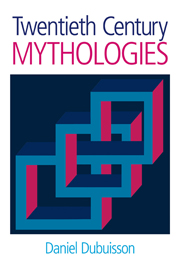Book contents
- Frontmatter
- Epigraph
- Contents
- Foreword by Professor Robert A. Segal
- Preface
- Abbreviations
- Introduction: History and comparative epistemology
- Part I Georges Dumézil, or Society
- Part II Claude Lévi-Strauss, or the Mind
- 7 The symbolic order
- 8 The Mythologiques: from overture to finale
- 9 From Marx to Kant
- 10 The semantics of myth
- 11 A Buddhist among the Bororo
- Part III Mircea Eliade, or the Sacred
- Conclusion: Modern theories of myth and the history of Western thought
- Bibliography
- Index
8 - The Mythologiques: from overture to finale
from Part II - Claude Lévi-Strauss, or the Mind
- Frontmatter
- Epigraph
- Contents
- Foreword by Professor Robert A. Segal
- Preface
- Abbreviations
- Introduction: History and comparative epistemology
- Part I Georges Dumézil, or Society
- Part II Claude Lévi-Strauss, or the Mind
- 7 The symbolic order
- 8 The Mythologiques: from overture to finale
- 9 From Marx to Kant
- 10 The semantics of myth
- 11 A Buddhist among the Bororo
- Part III Mircea Eliade, or the Sacred
- Conclusion: Modern theories of myth and the history of Western thought
- Bibliography
- Index
Summary
Before examining in detail the complex system organized by the expressions and rules of the “binary logic” on which rest both exegesis and the most general philosophical considerations developed in the 2000-odd pages of the Mythologiques, this work itself must first be introduced. Too often, in fact, when we have taken from it only isolated reflections or certain categorical affirmations regarding structural method, we have neglected the long and minute commentary to which Lévi-Strauss turned his hand. Now as this commentary was designed to justify and validate the quite general postulates summed up in the preceding chapter, the best service the reader could render to the work would be to take it for what it is: a new and exemplary analysis, devoted to an extremely large number of myths of the two Americas. With this deliberate return to the sources and interpretive practice of the author, the philosophical considerations and conclusions previously evoked will find both their place and their limit.
The Mythologiques present themselves as a long series of commentaries grouped around a number of general themes, most often with enigmatic titles. The object of these analyses is an immense corpus of myths – more than 800 – taken from dozens of different tribes across the two Americas. In fact, two geographic poles emerge: the first, in the south, is centred on present-day Brazil; the second, obviously in the north, occupies the neighbouring regions of Vancouver Island as well as a large part of the prairies found at approximately the same latitude.
- Type
- Chapter
- Information
- Twentieth Century Mythologies , pp. 117 - 140Publisher: Acumen PublishingPrint publication year: 2006



